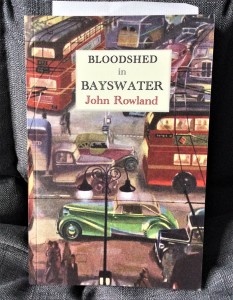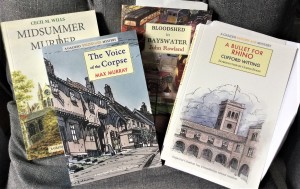It’s been a little while since I featured any Golden Age crime on the Ramblings, and after the heavier reads at the end of May (Bulgakov, Perec) I felt in need of a little contrast. Fortunately, lovely Galileo Publishers came to the rescue, as they’ve been kind enough to send me a wonderful selection of review copies. It was hard to choose as all of them sound marvellous, but in the end I went for a title by an author I’ve read before – “Bloodshed in Bayswater” by John Rowland.
I’ve read a couple of Rowland’s mysteries before, as two titles (“Calamity in Kent” and “Murder in the Museum“) have been reissued as British Library Crime Classics. I enjoyed both of them immensely, so was very much looking forward to this story, first published in 1935. Once again, the detecting is done by Rowland’s regular sleuth, Inspector Shelley – though much of the story is related from the viewpoint of our main protagonist, Margery Latimer. A secretary who lives in a boarding house in Bayswater, she’s awakened one night by a scream outside her window. Peering out, she sees a man hurrying away from a car and down the street; and the arrival of the police reveals that she has been witness to a murder. The authorities are baffled, but Margery is flummoxed the next day when she arrives at work. Her employer, Mr Bellingham, a man who’s been her guardian for most of her life, seems agitated; and he explains he’s about to retire, and encourages her to take up new employment.
The outfit he’s steering her towards is the National Anti-Speed Association, and the man running this is one John Cook. Imagine Margery’s surprise on meeting him, then, to find that he’s the man she saw running away from the crime scene the previous night. For some reason, however, she’s reluctant to reveal this to Shelley… Margery takes the job, but then another murder follows and Shelley begins to dig deeper. Margery herself tries to do a little investigation, but events become murkier and murkier, and she reveals more questions than answers! Why *is* John Cook really running the Association? Why is Mr. Bellingham behaving so oddly and very much out of character? When Cook disappears and the murders continue, events will become very dangerous for Margery, and the plot will be much darker than originally appeared…
“Bloodshed…” is an engrossing and very enjoyable read, and if I’m honest is not so much a pure crime classic as a criminal caper with thriller elements (which is how I felt about “Calamity..”) Rowland seems to enjoy pairing his detective with a member of the public who’s swept up in the action and tries to do a bit of detecting, and that works well here. Margery is a plucky and winning heroine, obviously somewhat smitten with Cook and determined to prove his innocence, and so this of course puts her at odds with Shelley at times. There are plenty of red herrings, a likeable office boy, some ruthless criminals and an unexpected motive behind all of this!
As for the solution, well I did and I didn’t see it coming! Rowland plays fair in many respects, and I suspected one particular character from hints he placed during the narrative – although my suspicion of their guilt didn’t reveal the whole story behind their motivations. The reasons for the murders were something I didn’t pick up on, as these are much more complex than seems at the start of the book; and what seem to be killings from some kind of fanatical reason actually have a bigger plot behind them. There’s plenty of excitement as the mystery builds to a climax. and the big reveal is very satisfying (although you *do* have to be prepared to accept some elements which might not be so convincing nowadays).
So “Bloodshed in Bayswater” really hit the spot. It’s an engaging and entertaining mystery thriller, with a bit of romance thrown in for good measure, and plenty of pace, which did keep me hooked until the end. The criminals really are baddies, there are clandestine organisations, petty crooks, plodding and not-so-plodding policemen and, all in all, I enjoyed re-encountering the writing of John Rowland. I don’t know what else of his is currently in print, apart from the three titles I’ve mentioned, but I shall certainly look out for more of them!
(Review copy kindly provided by the publishers, for which many thanks!)








Jun 14, 2024 @ 10:02:19
This sounds fun – if that’s the right word for murder and mayhem! – and I do like Galileo’s cover designs: a bit of a hint of Wordsworth Classics reissues with those pale yellow title panels, but classy choices for cover illustrations are always a draw for me.
Jun 14, 2024 @ 10:48:54
Fun is a good word for it – plenty of hijinks and lots of mystery. I did enjoy it. And I agree about the cover designs, this one really jumps out at you and would definitely catch the eye in a bookstore!
Jun 14, 2024 @ 10:33:29
I haven’t read this, or anything else by John Rowland, but it’s always good to see other publishers reissuing classic crime novels, as well as the British Library. The only problem is keeping up with them all! This one does sound entertaining.
Jun 14, 2024 @ 10:47:59
I do enjoy the Rowlands – more thrillers than mysteries perhaps, but very entertaining and I’m glad he’s being reissued. Though I agree with you that it’s hard to keep up with the reeleases!!
Jun 14, 2024 @ 12:10:24
I suspect that the British Library Crime Classics have paved the way for other entrants into this section of the market – which is great for fans of vintage crime fiction! Bloodshed in Bayswater sounds very immersive, and a London setting always appeals. Plus, I do like a caper! 🙂
Jun 14, 2024 @ 19:44:08
I think you’re right, and there were obviously a phenomenal amount of GA crime books published as the reprints just keep coming! I’ve enjoyed all of the Galileos I’ve read so far, and this one was particularly stylish!
Jun 14, 2024 @ 12:10:45
This does sound entertaining! I like the mix of thriller-esque elements and the caper sort of story. Sometimes that can work quite well. The character interplay sounds effectively done, too. Glad you enjoyed this.
Jun 14, 2024 @ 19:43:15
It is Margot, a bit of a twist on the GA crime book. So often they can be country house types, but this blends thriller and mystery very well!
Jun 14, 2024 @ 14:10:57
Isn’t that a lovely moment, when you’re between books (or, at least, searching for another to add to the stack) and there are new ones (at least, new-to-you options) and you can sit and pet them and contemplate each and imagine how your current stack would be with THAT one added in, and then, at last, pluck one from the group.
Jun 14, 2024 @ 19:42:35
Lol, it is – I’m lucky to have so many choices, really, but it’s a real delight organising the stacks and picking the next book!
Jun 14, 2024 @ 16:40:57
I didn’t know about Galileo, always an education! And this sounds fun, thanks!
Jun 14, 2024 @ 19:41:31
I’ve read a few of Galileo’s releases now, and they’ve all been interesting. They put out names mostly new to me, so it was nice to find one here I’d read before.
Jun 14, 2024 @ 16:49:24
This sounds really entertaining! I think I’ve read Calamity in Kent but nothing else by this author, I’ll have to look out for him again.
Jun 14, 2024 @ 19:40:49
I enjoyed it a lot – a real caper of the era, a nice blend of mystery and thriller. Definitely worth checking out!
Jun 15, 2024 @ 03:05:42
Bloodshed in Bayswater–my thought was someone ran over one of those protestors your police don’t move lol…. Glad I was wrong…I guess…
Jun 15, 2024 @ 14:47:04
LOL, no it’s a little longer ago than that!!
Jun 16, 2024 @ 00:39:45
LOL I know….lol.. super cover was the tip
Jun 16, 2024 @ 06:32:23
🤣🤣🤣
Jun 16, 2024 @ 17:11:39
Oh this does sound good. I love the sound of Margery she sounds like a brilliant GA type of heroine. It never ceases to amaze me what an apparently inexhaustible amount of GA mystery novels there are waiting to be reissued.
Jun 16, 2024 @ 18:27:33
It’s great fun, Ali, and Margery is a wonderfully feisty heroine. It *is* amazing how many GA novels there are, they must have been coming out left right and centre during their heyday!
Jun 17, 2024 @ 17:50:55
Sounds like a fun one, but there are SO MANY of these as you mention above!
Jun 17, 2024 @ 19:51:15
There are! I can’t keep up with them all, so I tend to just pick the ones which take my fancy or by authors I know!
Jun 17, 2024 @ 21:56:17
This sounds the perfect book when you want a break from the meatier kinds of narrative. Isn’t the cover artwork wonderful?
Jun 18, 2024 @ 11:54:15
Absolutely that – I like the heavier books, but always need to balance them with something like this. And yes, the cover is gorgeous!!